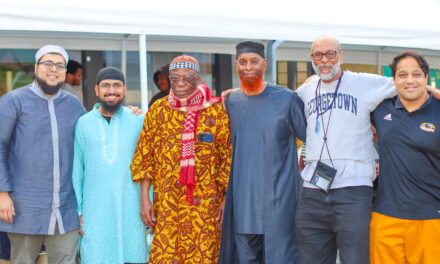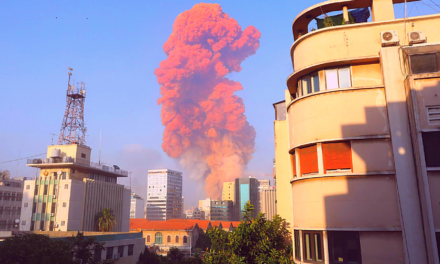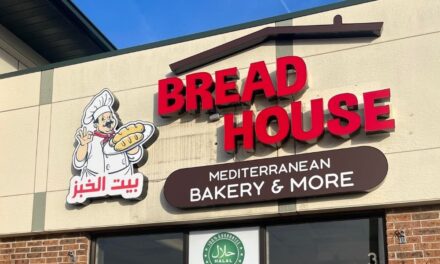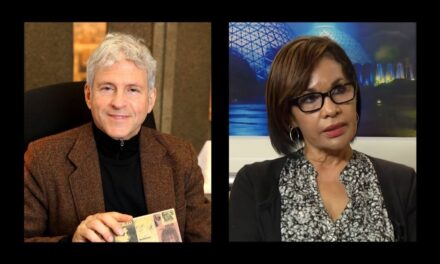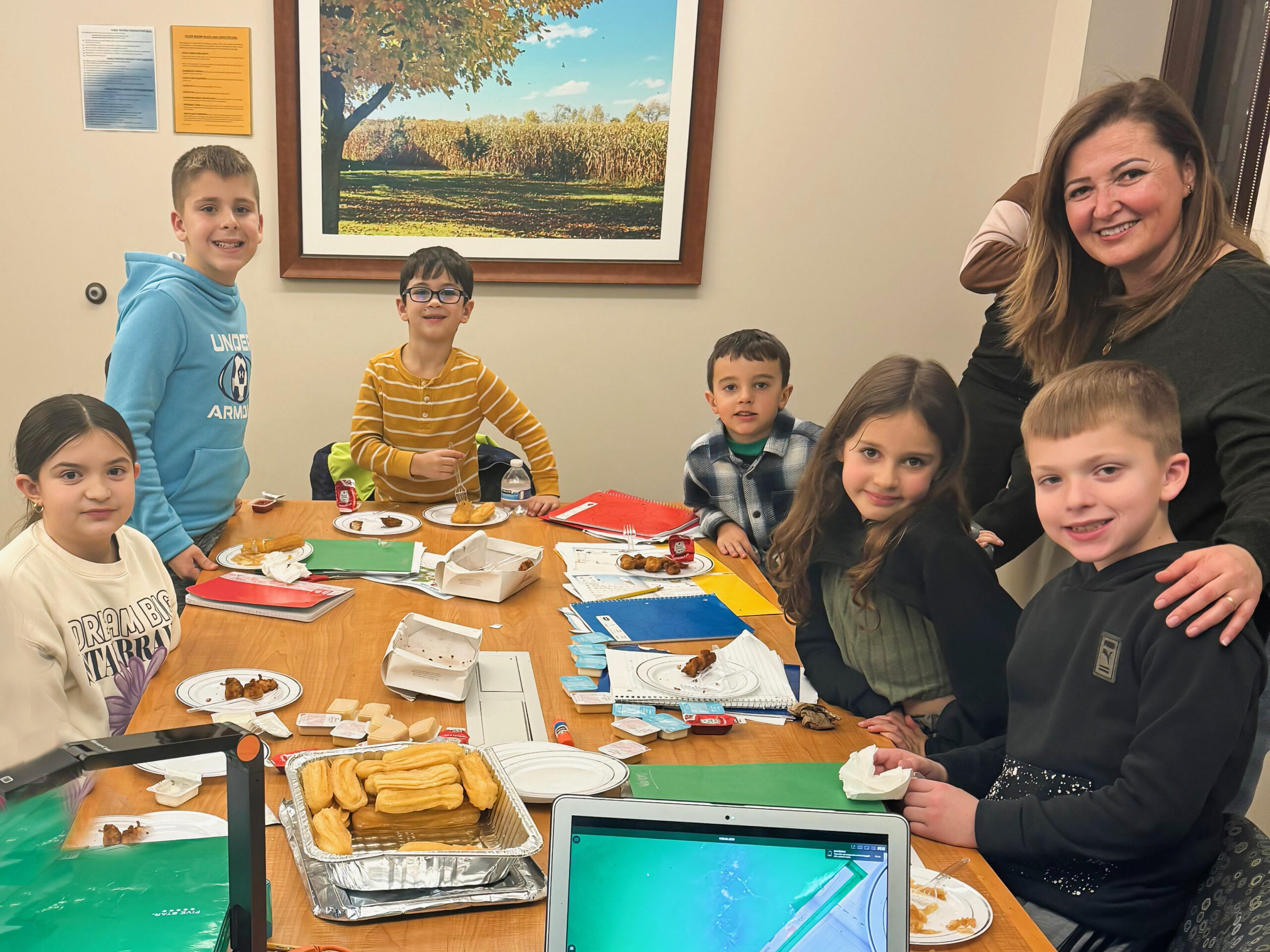
Albanian language students and their teacher Albana Zagloul celebrated Albanian Independence Day Nov. 28 during class at the Oak Creek Library.
By all accounts, longtime Milwaukee Muslim community member Albana Zagloul has just gone through a midlife crisis—that phase of reflection that strikes in one’s 40s or early 50s as they confront their own mortality. In the past few years, she faced the major triggers: a big life transition, an empty nest and the loss of a loved one.
Her husband, Mohammed Zagloul, eyeing retirement, envisions their new life as one of travel with occasional stops in their San Diego home, now enjoyed only by renters. They sold their Franklin home in preparation for the move and are renting in Greendale. Albana knows she’ll make new friends but will be sad to leave relationships nurtured in her almost 30 years in Greater Milwaukee.
Their children, Hassan and Maie, will also soon move as they both embark on the training stage of their medical school education.
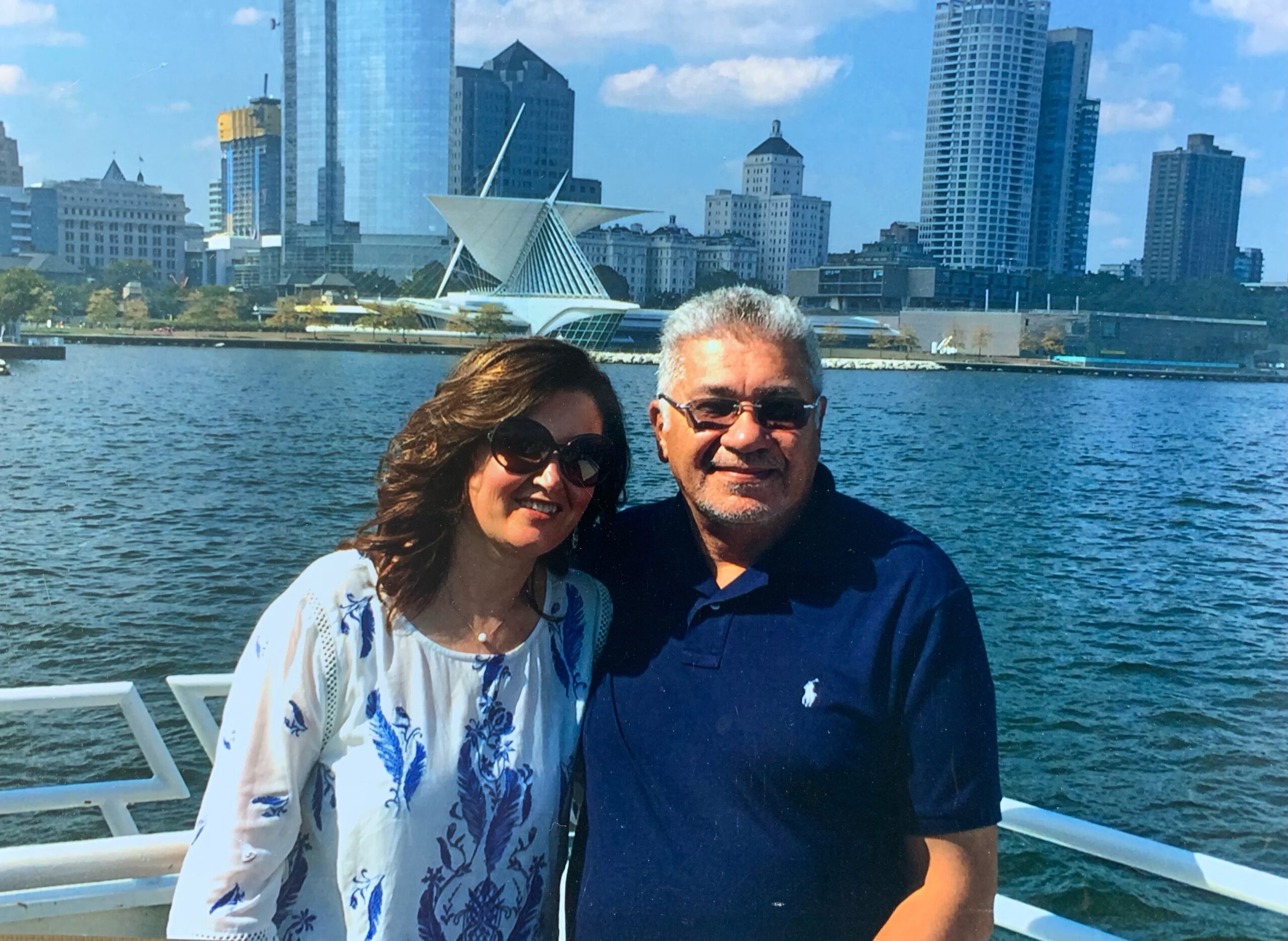
Albana and Mohammed Zagloul at Lake Michigan in 2022, with Milwaukee’s skyline in the background.
Most difficult of all, her beloved father died in Albania in 2021 after a 13-year-long fight with cancer. Following his footsteps as a poet, writer and teacher, Albana misses their talks, his advice and especially his love, she said.
For the past three years, honoring his life has been foremost in her mind. She wants to live a life that would make him proud—one that contributes in meaningful ways to the lives of others and uses her talents and abilities to the fullest.
Imagining what that would mean led her to discover her calling—to create a full-service community center for Milwaukee’s Albanian American community. In an interview last week with the Wisconsin Muslim Journal, Zagloul talked about her new mission, the launch of Shqiptarët në Wisconsin (Albanians of Wisconsin) and her vision of its future.
The ticking clock
Seeing her children practically grown and her father’s health decline as she approached 50, Zagloul felt her own life speeding by. Shouldn’t I do more with my life? she asked herself.
She thought a new career in nursing would be fulfilling and completed her application to Marquette University’s College of Nursing while in Albania in 2021. She was there to celebrate the New Year and her father’s Jan. 6 birthday, unaware he would die that August. She won acceptance to Marquette, contingent on successful completion of two prerequisite courses.
Back in Milwaukee, she continued her work as a translator while earning As in both courses, only to decide she could not justify the expense of a nursing education, especially with two children in medical school. Instead, she worked on a children’s book about Hassan and Maie’s transnational phone conversations with their Albanian grandfather.
She also began writing her life story—about leaving her homeland for the first time in October 1995 to move to Milwaukee, the bride of a civil engineer with whom she did not share a common language (Mohammed speaks Arabic and English. At the time, Albana only spoke Albanian).

Albana Zagloul and her father Servet Gurra on his 77th birthday, Jan. 6, 2021.
Zagloul recalled her first Wisconsin winter and wrote about missing not only the comparative mildness of Albania’s weather, but her homeland’s warm relationships. Daily life in Albania is filled with visits and chats with family, friends and neighbors. In her first year in Milwaukee, she racked up more than $800 a month in phone calls to parents she sorely missed, she confessed.
When friends in Milwaukee talk about Zagloul’s first years in America, the stories sound unbelievable. She learned two languages (English and Arabic) and Egyptian cooking, and had two children. On a moment’s notice, she put on extravagant dinners with appetizers, sides, a couple of entrees and a variety of desserts, whipped up from a freezer packed at the ready with foods she prepared, just in case anyone dropped by. Whenever she had a quiet moment, she translated her poetry from Albanian to English or painted every room in her house.
As her children grew and spent more time at school, she earned a bachelor’s degree in linguistics from the University of Wisconsin-Milwaukee, all the while remaining an intensely engaged parent. Since then, she has worked as a translator in hospitals, schools and courtrooms.
Something more
Sitting with a WMJ reporter on a bench in Southridge Mall, Zagloul talked about the urgency she now feels to devote herself to something bigger than personal accomplishment. Her shoulder-length chestnut brown hair, almond-shaped hazel eyes and a slightly turned up smile became animated as her excitement rose. Her voice punctuated her points.
“I want to do something meaningful before time runs out!” she exclaimed. Zagloul asked herself, How can I make the best use of my abilities? What can I do well?
“I taught Albanian language and literature, just like my dad. That’s it! That’s what I’ll do,” she decided.
The death of her father, Servet Gurra, a well-known Albanian journalist and teacher, triggered her zeal for celebrating and preserving Albanian language and culture. “Since practically the moment my dad passed away, I question everything I am doing. Would my dad approve of this? Would he be proud of me?”
She posted Sept. 9 on her personal Facebook: “Gurra: An Albanian Online Kids Program begins Sept. 24. Give your child this opportunity for a strong foundation in the Albanian Language. Age groups: 6 – 10 and 11-14.”

Maie and Hassan Zagloul, both in medical school, say they are proud of their mother.
“One mom contacted me and asked if I could teach her two children in person,” Zagloul said. They agreed to meet at the Greenfield Library. She called again and asked if she could bring a couple more students to the first lesson.
Zagloul’s reputation for well-planned, active lessons spread and attracted more students. She capped it at 15, the most she can handle at the moment, although she’d like to add one more class soon. She’s moved the twice-weekly sessions to the Oak Creek Library, near the city’s large Albanian community. “Passing knowledge on to the next generation, especially language, a tool that connects them to their homeland and heritage, is so important,” she said.
Kaltrina and Lati Ziba of Oak Creek “jumped on the chance” to enroll their two children, 6 and 8, in Albanian language classes, Kaltrina told WMJ. “Milwaukee has never had something like this before even though we have quite a large community here.
“Her classes are especially good for our children. Lati and I speak different dialects. He’s from North Macedonia and I’m from Kosova. She is teaching them proper Albanian, correct grammar, the alphabet and how to write it, which is wonderful.
“What’s a huge part for me is not just learning the language. Giving our kids the chance to meet Albanian friends is really important to me. They hang out at the library after class and interact with each other. I want them to know a little bit about their roots and our culture. I don’t want them to lose that.”
A place for Albanians
Zagloul posted again Sept. 15. She wrote about how much meeting another Albanian family in her first year in Milwaukee meant to her. She talked about the growth of Wisconsin’s Albanian community, especially in Kenosha, South Milwaukee and Oak Creek. (Estimates put Wisconsin’s Albanian population at nearly 5,000, with the majority living in those three cities.)
“So why don’t we have an Albanian Culture Center in Milwaukee—like the Italians, Germans, Polish and others?” she asked.
She imagined a “welcoming place” for Albanians of all faiths or none, who cherish their heritage. It would include a library, filled with books in Albanian; classrooms where the Albanian language is taught; a free weekly health clinic for people without insurance; and activities and field trips for seniors who are too often isolated and lonely.
Wasting no time, she added a call to action. “Send me a message with your thoughts and suggestions. I am working on opening this non-profit organization. It is in our hands to let this idea fade and go away or to start building it all together.”
“Albana has a wonderful idea that a lot of people are excited about,” said Klara Gercaliu of Brookfield, who has been friends with Zagloul for more than 20 years, since they worked together at the International Institute of Wisconsin. “It’s about preserving our culture.”
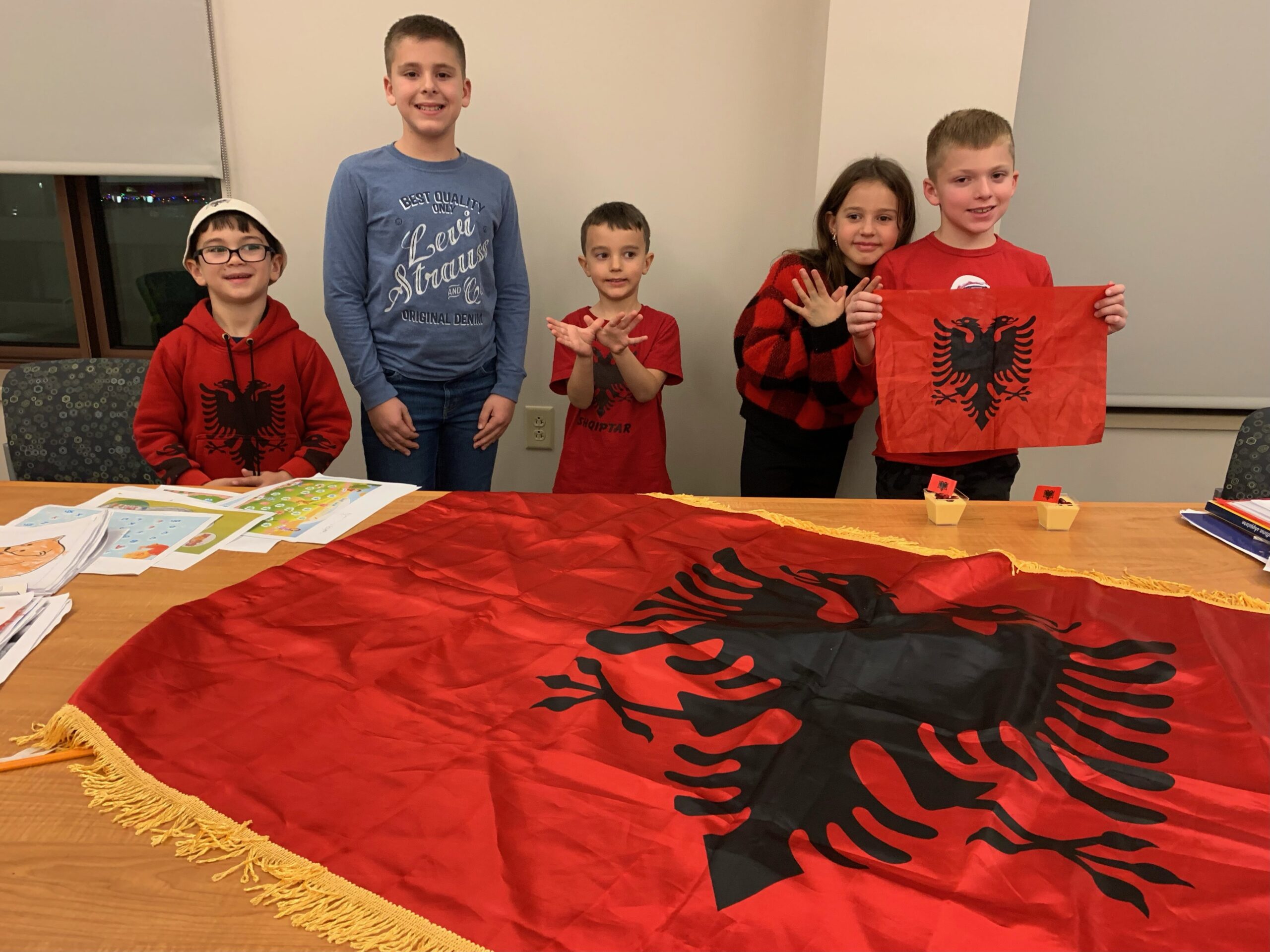
Students in Zagloul’s language class celebrated Albanian Independence Day Nov. 28.
Zagloul will be the first to say other Albanian Wisconsinites have thought it before. Several Facebook groups provide platforms for Albanians to share information and promote each other’s businesses. An Albanian doctor occasionally offers free clinics. A non-profit Albanian community organization promotes and showcases Albanian culture in Wisconsin.
Zagloul figures the more the merrier. Her father would be glad others share this mission, she said.
“Still, we don’t have a center,” she insisted. Zagloul calls on all who share her desire for an Albanian community center with wide-ranging services to join her. Out the gate, Albanians of Wisconsin provides weekly and monthly activities for youth and seniors, and promotes Albanian culture, offering to host an exhibit at community and school festivals and events.
As one of the youngest immigrant communities in Wisconsin (many Albanians came here in the early 1990s), there is lots of groundwork to do, Gercaliu said. “We don’t have a big community. Albanians are a newer population.”

Albanians of Wisconsin provided an exhibit Feb. 15 for the Franklin High School Culturefest.
First generation immigrants work hard for the American dream, she continued. Many Albanians own businesses and buy houses. They have worked hard to put their children in the best schools, she said. As a community grows, their focus shifts to preserving its culture and values.
“To that end, Albana is starting early and she’s working hard to make it happen. I am proud to be her friend,” Gercaliu said.
“Albana is just such an amazing person,” Ziba agreed. “She is giving so much to the community.
Zagloul’s husband Mohammed believes she has the ability to bring the Albanian community together and make her vision a reality. “She is one of the most socially smart people a person can meet,” he said. “She can easily understand the person in front of her and be sensitive to the needs of others. She has the social drive to connect with others and a leader’s personality to initiate enthusiasm.”
“My mom has always been super creative and she loves opportunities that foster community and tradition,” Hassan said. “She is very hardworking, and once she comes up with a new idea she is determined to see it become reality.”
“If I were to sum up my mom in one sentence, I’d say she has the determination to do whatever she sets her mind to—and she’ll do it all with grace,” Maie told WMJ.
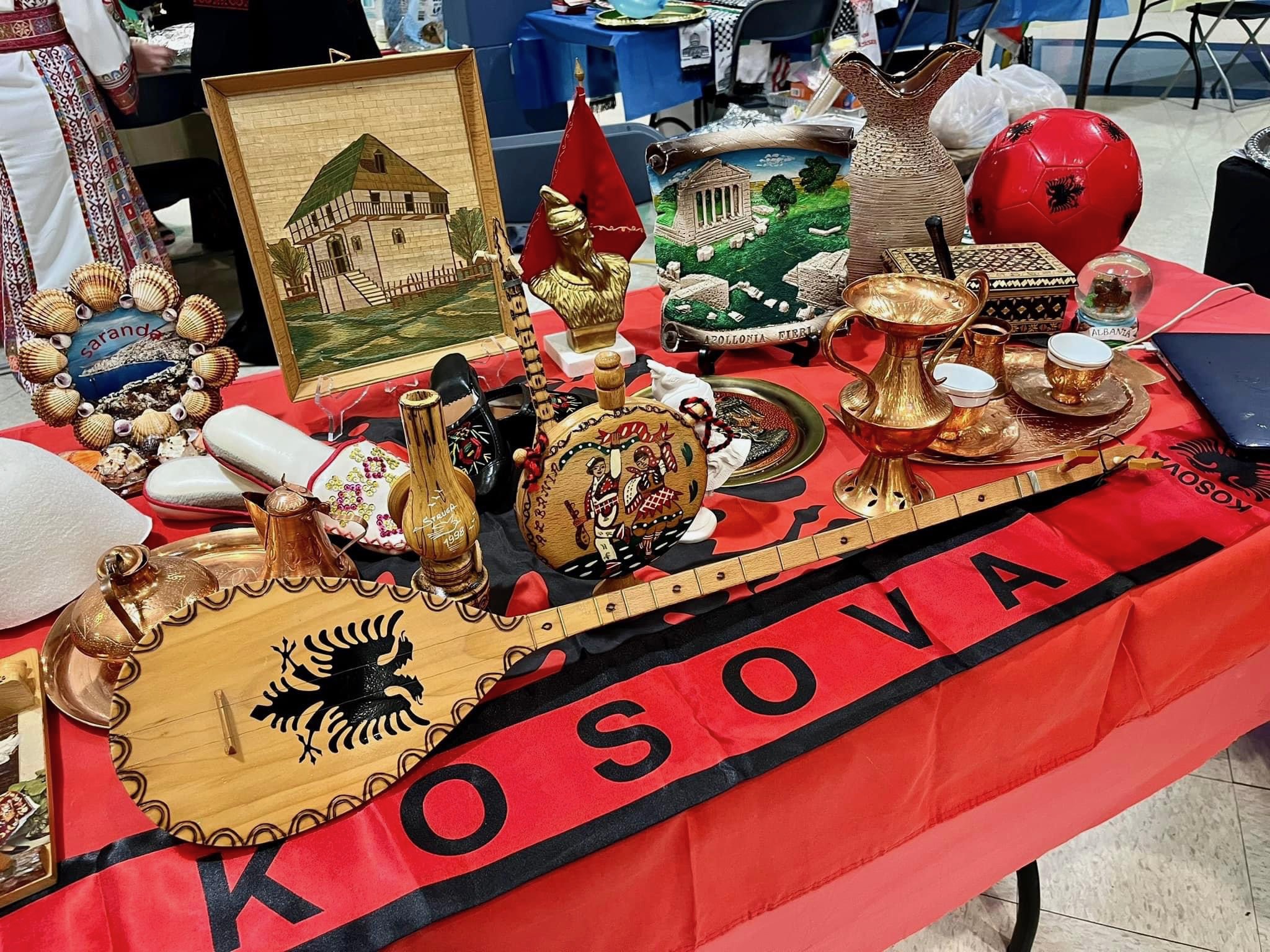
Many Albanian Americans came to the U.S. during the Kosovo War, 1998-99, when roughly a million ethnic Albanians fled or were forcefully driven from Kosovo.
Launching Albanians of Wisconsin
While there is still lots of work to be done to establish a brick-and-mortar community center with a physical location, Albanians of Wisconsin is moving ahead at full speed with activities for children, youth and seniors. At present, Zagloul is completing the paperwork to make Albanians of Wisconsin an official non-profit organization.
The social, cultural and service organization defines its mission as: “to enhance the well-being of the Albanian community. We strive to benefit our community by assisting and helping one another through education, information sharing, advice, resources and cultural events.”
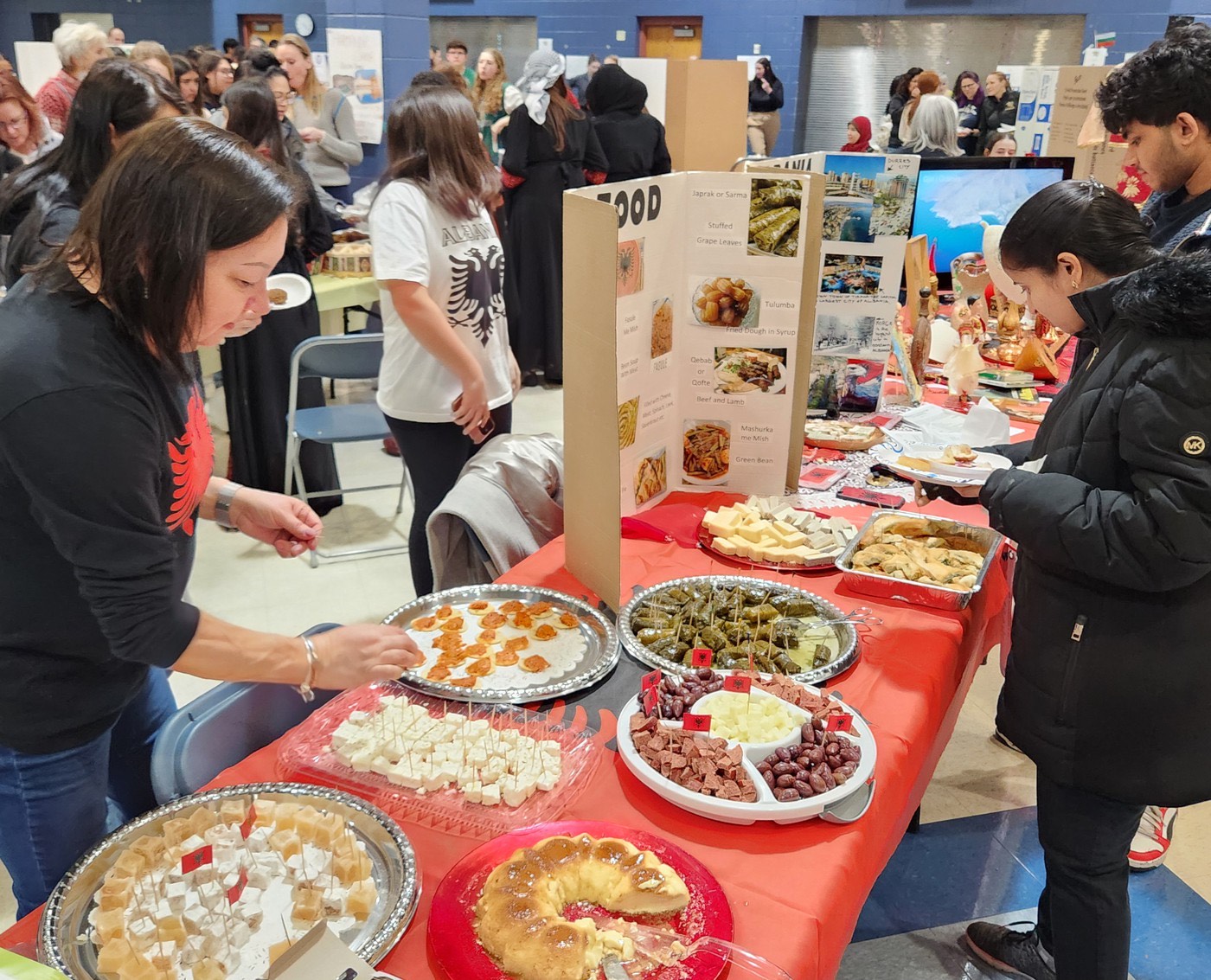
Guests at Franklin High School Culturefest Feb. 15 enjoy Albanian appetizers and desserts, courtesy of the Albanians of Wisconsin.
Zagloul launched a private Facebook group, Shqiptarët në Wisconsin (Albanians of Wisconsin) on Nov. 26. It has 473 members so far.
Three Albanian women volunteered to serve with her on the board. They have been instrumental in supporting the group’s activities and making things happen, Zagloul said.
In addition to language classes, a story time for young children meets monthly. At the first one, held in February, Zagloul read Ti je Shqiptar (You are Albanian) and other stories. Children played games, including “Pin the Heart on the Bear” and musical chairs. They colored pages that featured facts about Albania. The next story time, March 18, will be about space missions. In April, the theme is nutrition.
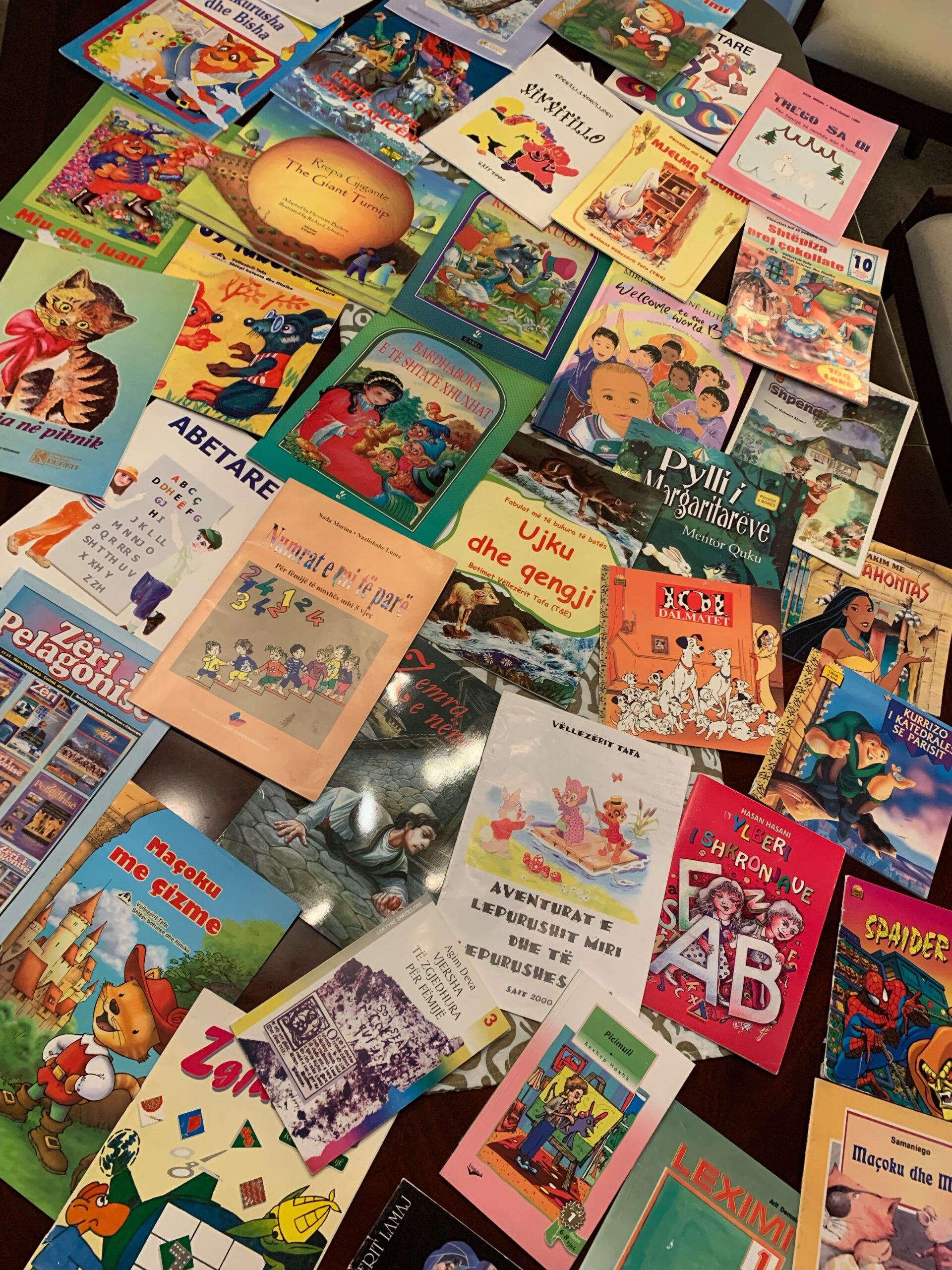
Noli Vokshi Morina contributed many books in Albania that Zagloul hopes will be the beginning of a library in the culture center Albanians of Wisconsin hope to create.
Monthly activities for seniors started in January with a midday get-together for coffee and dessert at Burger Town in South Milwaukee. “We were thinking about a lot of our parents, especially those who came from overseas,” Zagloul said. “They don’t speak English. They don’t drive. So, they’re spending most of the time at home while their kids are working. We want to create a small community, where they can meet each other and talk.”
At their January gathering, three board members led seven seniors in a discussion about their lives in American and what they missed most from back home, which is “everything—their families, hometowns, food, conversations with neighbors, being independent—not needing someone to drive them from here to there or to speak for them because of a language barrier,” Zagloul said. They talked of their fear that their children or grandchildren may lose the ability to speak Albanian or forget traditions. They all agreed they’d like to continue meeting once a month.
In addition, the organization participated at the Franklin High School Culturefest in February with an exhibit. Students in language classes celebrated Albanian Independence Day on Nov. 28 and Kosovo Independence Day on Feb. 17.
She also began writing her life story—about leaving her homeland for the first time in October 1995 to move to Milwaukee, the bride of a civil engineer with whom she did not share a common language (Mohammed speaks Arabic and English. At the time, Albana only spoke Albanian).
At Albanian language lessons last week, “a visitor came to us, giving us books written in or translated to Albanian,” Zagloul said. “The books … will pass into the hands of many students, helping them to read, speak and understand our language.”
“My husband said, ‘I wish you started this earlier,’” Zagloul said. “He sees how happy I am and how this has changed my life. He told me, ‘You finally found yourself.’”
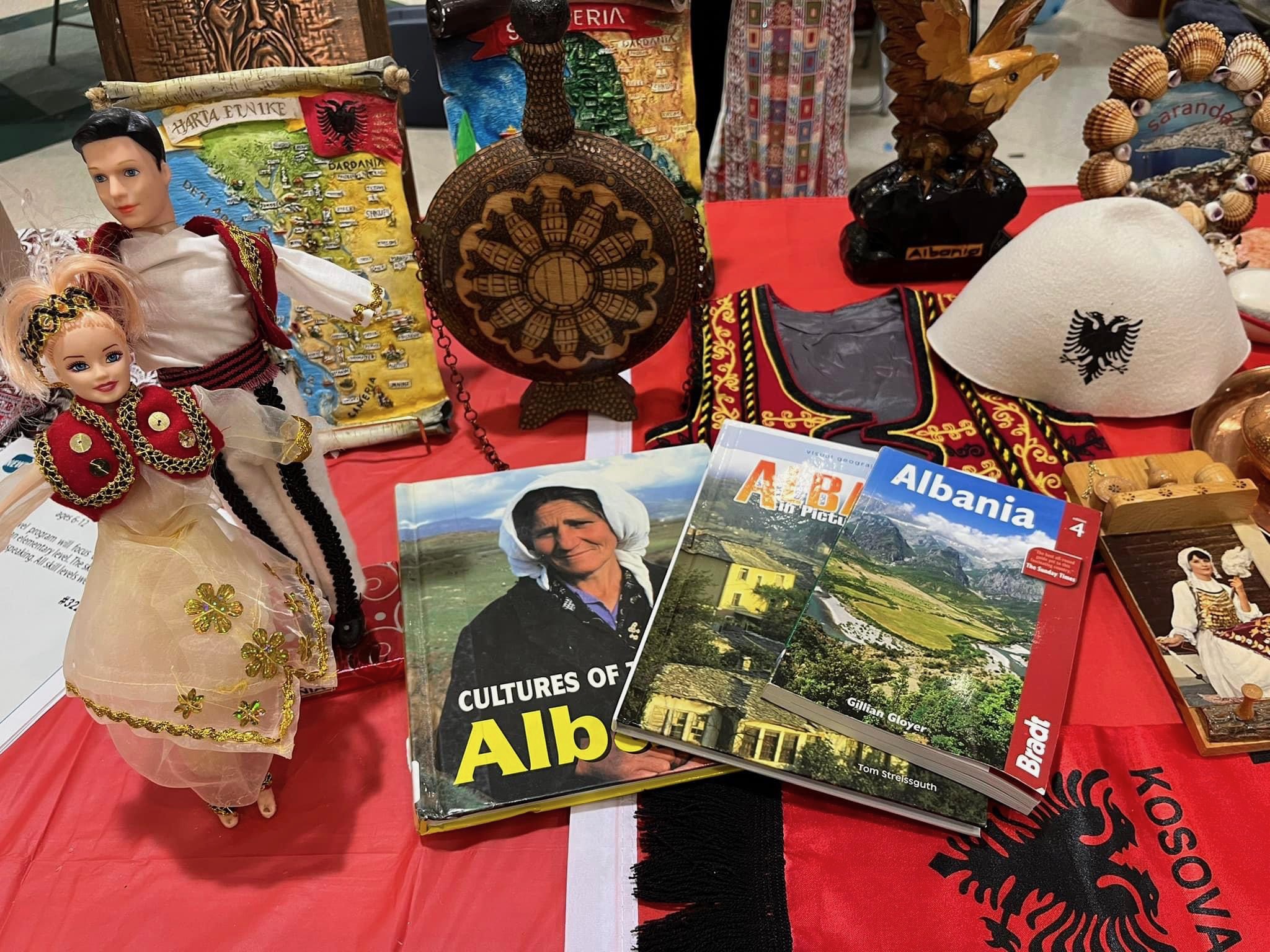
Albanians of Wisconsin appreciate opportunities like the Franklin High School Culturefest, where they can share their history and culture with others.
